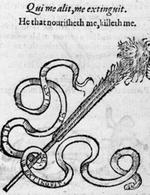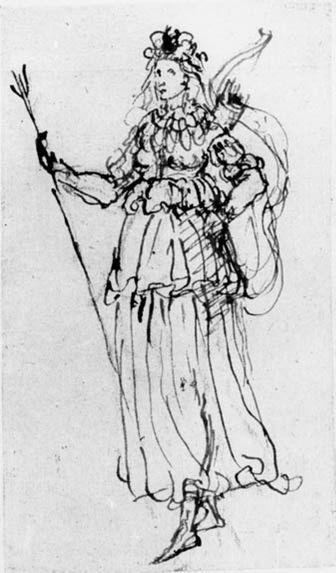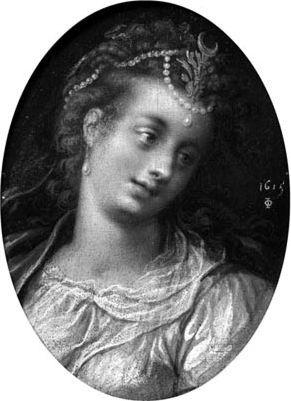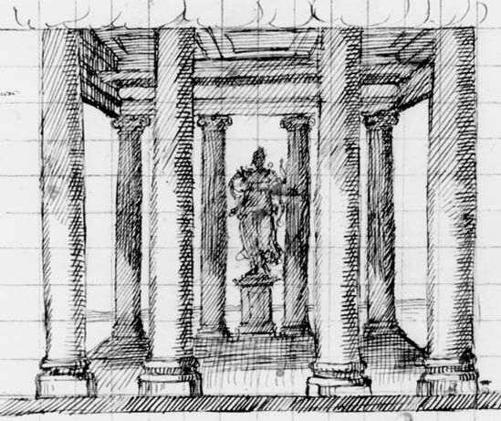William Shakespeare: The Complete Works 2nd Edition (479 page)
Read William Shakespeare: The Complete Works 2nd Edition Online
Authors: William Shakespeare
Tags: #Drama, #Literary Criticism, #Shakespeare

BOOK: William Shakespeare: The Complete Works 2nd Edition
6.61Mb size Format: txt, pdf, ePub
18.
From
The Heroical Devices of M. Claudius Paradin
, translated by P.S. (1591), sig. Z3. This is the source for the impresa of the Fourth Knight, in Sc. 6.
From
The Heroical Devices of M. Claudius Paradin
, translated by P.S. (1591), sig. Z3. This is the source for the impresa of the Fourth Knight, in Sc. 6.

19.
An Inigo Jones sketch of Diana, probably for Ben Jonson’s masque
Time Vindicated
(1623). The goddess of chastity appeared as a character in court entertainments, masques, and plays, and her representation was governed by iconographic convention. As goddess of hunting, she was most often identified by her ‘silver bow’ (21.234). In Thomas Heywood’s
The Golden Age
(1611), stage directions refer to
‘Diana’s
bow’ (sig. EI
v
) and her
‘buskins’
(sig. E3
v
); her
‘nymphs’
explicitly, and by inference she, have
‘garlands on their heads, and javelins in their hands ... bows and quivers’
(sig. D3
v
). The bow, quiver, and javelin, all visible in Jones’s sketch, were commonplace in emblematic representations. As a huntress, Diana could naturally be envisaged in a chariot: in Aurelian Townshend’s masque
Albion’s Triumph
(1631), she descends ‘in her chariot’ (pp. 2, 12); in
Time
Vindicated, ‘Diana descends’ (1. 446). Such descents for deities were used in the public theatres, too, usually in a chair or chariot (21.224.2).
An Inigo Jones sketch of Diana, probably for Ben Jonson’s masque
Time Vindicated
(1623). The goddess of chastity appeared as a character in court entertainments, masques, and plays, and her representation was governed by iconographic convention. As goddess of hunting, she was most often identified by her ‘silver bow’ (21.234). In Thomas Heywood’s
The Golden Age
(1611), stage directions refer to
‘Diana’s
bow’ (sig. EI
v
) and her
‘buskins’
(sig. E3
v
); her
‘nymphs’
explicitly, and by inference she, have
‘garlands on their heads, and javelins in their hands ... bows and quivers’
(sig. D3
v
). The bow, quiver, and javelin, all visible in Jones’s sketch, were commonplace in emblematic representations. As a huntress, Diana could naturally be envisaged in a chariot: in Aurelian Townshend’s masque
Albion’s Triumph
(1631), she descends ‘in her chariot’ (pp. 2, 12); in
Time
Vindicated, ‘Diana descends’ (1. 446). Such descents for deities were used in the public theatres, too, usually in a chair or chariot (21.224.2).

20.
A miniature of Diana by Isaac Oliver (1615): the dress is yellow, the scarf a gauzy pink-white, the cloak over her right shoulder blue; the leaf-shaped brooch topped by the crescent moon, gold. In Samuel Daniel’s masque
The Vision of the Twelve Goddesses
(1604), ‘Diana, in a green mantle embroidered with silver half moons, and a crescent of pearl on her head, presents a bow and quiver’ (sig. A5). The ‘crescent of pearl’—an ornamental crescent moon, also detectable in Jones’s sketch—can be seen in many emblematic representations of the goddess.
A miniature of Diana by Isaac Oliver (1615): the dress is yellow, the scarf a gauzy pink-white, the cloak over her right shoulder blue; the leaf-shaped brooch topped by the crescent moon, gold. In Samuel Daniel’s masque
The Vision of the Twelve Goddesses
(1604), ‘Diana, in a green mantle embroidered with silver half moons, and a crescent of pearl on her head, presents a bow and quiver’ (sig. A5). The ‘crescent of pearl’—an ornamental crescent moon, also detectable in Jones’s sketch—can be seen in many emblematic representations of the goddess.

21.
For the pastoral
Florimène
(1635), Inigo Jones designed two scenic views of ’The Temple of Diana’ (see 1. 22.17.1). Though such scenes were not used in the public theatres in Shakespeare’s time, the columns supporting the overhanging roof of the public stage (see General Introduction, pp. xxvii-xxix) could have created a scenic effect roughly similar to Jones’s recessed classical temple. Statues were also available as props in the public theatre; in
Pericles,
as in
The Winter’s Tale,
the statue could have been impersonated by an actor on a pedestal. Whether or not a statue was visible, the temple could be identified by an altar (as in
The Two Noble Kinsmen
).
For the pastoral
Florimène
(1635), Inigo Jones designed two scenic views of ’The Temple of Diana’ (see 1. 22.17.1). Though such scenes were not used in the public theatres in Shakespeare’s time, the columns supporting the overhanging roof of the public stage (see General Introduction, pp. xxvii-xxix) could have created a scenic effect roughly similar to Jones’s recessed classical temple. Statues were also available as props in the public theatre; in
Pericles,
as in
The Winter’s Tale,
the statue could have been impersonated by an actor on a pedestal. Whether or not a statue was visible, the temple could be identified by an altar (as in
The Two Noble Kinsmen
).

THE PERSONS OF THE PLAYJohn GOWER, the PresenterANTIOCHUS, King of AntiochHis DAUGHTERTHALIART, a villainPERICLES, Prince of TyreMARINA, Pericles’ daughterCLEON, Governor of TarsusDIONIZA, his wifeLEONINE, a murdererKING SIMONIDES, of PentapolisTHAISA, his daughterThree FISHERMEN, his subjectsFive PRINCES, suitors of ThaisaA MARSHALLYCHORIDA, Thaisa’s nurseCERIMON, a physician of EphesusPHILEMON, his servantLYSIMACHUS, Governor of MytileneA BAWDA PANDERBOULT, a lenoDIANA, goddess of chastityLords, ladies, pages, messengers, sailors, gentlemen
Enter Gower as Prologue
GOWER
To sing a song that old was sung
From ashes ancient Gower is come,
Assuming man’s infirmities
To glad your ear and please your eyes.
It hath been sung at festivals,
On ember-eves and holy-ales,
And lords and ladies in their lives
Have read it for restoratives.
The purchase is to make men glorious,
Et bonum quo antiquius eo melius.
If you, born in these latter times
When wit’s more ripe, accept my rhymes,
And that to hear an old man sing
May to your wishes pleasure bring,
I life would wish, and that I might
Waste it for you like taper-light.
This’ Antioch, then; Antiochus the Great
Built up this city for his chiefest seat,
The fairest in all Syria.
I tell you what mine authors say.
This king unto him took a fere
Who died, and left a female heir
So buxom, blithe, and full of face
As heav’n had lent her all his grace,
With whom the father liking took,
And her to incest did provoke.
Bad child, worse father, to entice his own
To evil should be done by none.
By custom what they did begin
Was with long use account’ no sin.
The beauty of this sinful dame
Made many princes thither frame
To seek her as a bedfellow,
In marriage pleasures playfellow,
Which to prevent he made a law
To keep her still, and men in awe,
That whoso asked her for his wife,
His riddle told not, lost his life.
So for her many a wight did die,
From ashes ancient Gower is come,
Assuming man’s infirmities
To glad your ear and please your eyes.
It hath been sung at festivals,
On ember-eves and holy-ales,
And lords and ladies in their lives
Have read it for restoratives.
The purchase is to make men glorious,
Et bonum quo antiquius eo melius.
If you, born in these latter times
When wit’s more ripe, accept my rhymes,
And that to hear an old man sing
May to your wishes pleasure bring,
I life would wish, and that I might
Waste it for you like taper-light.
This’ Antioch, then; Antiochus the Great
Built up this city for his chiefest seat,
The fairest in all Syria.
I tell you what mine authors say.
This king unto him took a fere
Who died, and left a female heir
So buxom, blithe, and full of face
As heav’n had lent her all his grace,
With whom the father liking took,
And her to incest did provoke.
Bad child, worse father, to entice his own
To evil should be done by none.
By custom what they did begin
Was with long use account’ no sin.
The beauty of this sinful dame
Made many princes thither frame
To seek her as a bedfellow,
In marriage pleasures playfellow,
Which to prevent he made a law
To keep her still, and men in awe,
That whoso asked her for his wife,
His riddle told not, lost his life.
So for her many a wight did die,
⌈
A row of heads is revealed⌉
As yon grim looks do testify.
What now ensues, to th’ judgement of your eye
I give, my cause who best can justify. Exit
What now ensues, to th’ judgement of your eye
I give, my cause who best can justify. Exit
⌈
Sennet
.⌉
Enter King Antiochus,
Prince
Pericles,
and ⌈
lords and peers in their richest ornaments
⌉
ANTIOCHUS
Young Prince of Tyre, you have at large received
The danger of the task you undertake.
The danger of the task you undertake.
PERICLES
I have, Antiochus, and with a soul
Emboldened with the glory of her praise
Think death no hazard in this enterprise.
ANTIOCHUS Music!
Emboldened with the glory of her praise
Think death no hazard in this enterprise.
ANTIOCHUS Music!
Music sounds
Bring in our daughter, clothèd like a bride
Fit for th’embracements ev’n of Jove himself,
At whose conception, till Lucina reigned,
Nature this dowry gave to glad her presence:
The senate-house of planets all did sit,
In her their best perfections to knit.
Fit for th’embracements ev’n of Jove himself,
At whose conception, till Lucina reigned,
Nature this dowry gave to glad her presence:
The senate-house of planets all did sit,
In her their best perfections to knit.
Enter Antiochus’ Daughter
PERICLES
See where she comes, apparelled like the spring,
Graces her subjects, and her thoughts the king
Of ev’ry virtue gives renown to men;
Her face the book of praises, where is read
Nothing but curious pleasures, as from thence
Sorrow were ever razed and testy wrath
Could never be her mild companion.
You gods that made me man,
and sway in love,
That have inflamed desire in my breast
To taste the fruit of yon celestial tree
Or die in the adventure, be my helps,
As I am son and servant to your will,
To compass such a boundless happiness.
Graces her subjects, and her thoughts the king
Of ev’ry virtue gives renown to men;
Her face the book of praises, where is read
Nothing but curious pleasures, as from thence
Sorrow were ever razed and testy wrath
Could never be her mild companion.
You gods that made me man,
and sway in love,
That have inflamed desire in my breast
To taste the fruit of yon celestial tree
Or die in the adventure, be my helps,
As I am son and servant to your will,
To compass such a boundless happiness.
ANTIOCHUS Prince Pericles—
PERICLES
That would be son to great Antiochus.
ANTIOCHUS
Before thee stands this fair Hesperides,
With golden fruit, but dang’rous to be touched,
With golden fruit, but dang’rous to be touched,
⌈
He gestures towards the heads
⌉
For death-like dragons here affright thee hard.
⌈
He gestures towards his daughter
⌉
Her heav‘n-like face enticeth thee to view
Her countless glory, which desert must gain;
And which without desert, because thine eye
Presumes to reach, all the whole heap must die.
Yon sometimes famous princes, like thyself
Drawn by report, advent’rous by desire,
Tell thee with speechless tongues and semblants
bloodless
That without covering save yon field of stars
Here they stand, martyrs slain in Cupid’s wars,
And with dead cheeks advise thee to desist
From going on death’s net, whom none resist.
Her countless glory, which desert must gain;
And which without desert, because thine eye
Presumes to reach, all the whole heap must die.
Yon sometimes famous princes, like thyself
Drawn by report, advent’rous by desire,
Tell thee with speechless tongues and semblants
bloodless
That without covering save yon field of stars
Here they stand, martyrs slain in Cupid’s wars,
And with dead cheeks advise thee to desist
From going on death’s net, whom none resist.
Other books
The Case of the Daring Divorcee by Erle Stanley Gardner
Deadly Focus by R. C. Bridgestock
Unforgettable by Karin Kallmaker
Shadows of Deceit (A Series of Shadows) by Mell Corcoran
The Calling by Nina Croft
In the Highlander's Bed by Cathy Maxwell
Broken Angels (Katie Maguire) by Masterton, Graham
Class Reunion by Juliet Chastain
Ceremony by Leslie Marmon Silko

